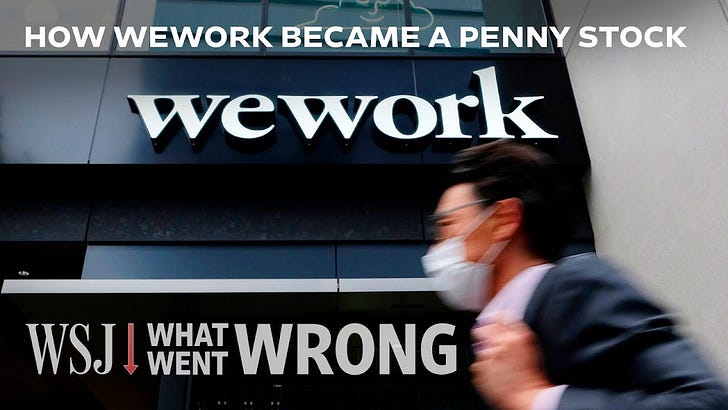WeWork: A Comprehensive Business Case Study
1. Introduction
WeWork is a global provider of coworking spaces, offering flexible workspaces, technology-driven amenities, and community experiences for freelancers, startups, and large enterprises. This case study provides an in-depth analysis of WeWork's journey, business model, strategies, challenges, and future prospects, tailored for MBA students.
2. Company Overview
Founders: Adam Neumann and Miguel McKelvey
Founded: 2010
Headquarters: New York City, USA
Industry: Real Estate, Coworking Spaces
Core Products: Coworking spaces, private offices, meeting rooms, and community events
3. Market Analysis
Market Size: The global coworking space market was valued at approximately $8.14 billion in 2020 and is expected to grow significantly.
Consumer Behavior: Increasing demand for flexible workspaces, rising freelance workforce, and preference for collaborative work environments.
Competitors: Regus, Spaces, Industrious, Knotel, and various local coworking space providers.
4. Business Model
WeWork operates on a space-as-a-service model, leasing large office spaces, transforming them into coworking environments, and renting them out to individuals and companies.
Space Leasing: Long-term leases of large office spaces in prime locations.
Workspace Transformation: Designing and furnishing spaces to create flexible and appealing work environments.
Membership Plans: Offering various membership plans, including hot desks, dedicated desks, private offices, and enterprise solutions.
Community and Events: Providing a community-centric experience with events, networking opportunities, and member benefits.
5. Evolution and Growth
Initial Phase: Started with a single location in New York City, focusing on creating a community for entrepreneurs and freelancers.
Expansion: Rapid global expansion, opening hundreds of locations in major cities worldwide.
Diversification: Introduction of WeLive (co-living spaces), WeGrow (education), and WeWork Labs (startup incubator).
Valuation Surge: Achieved a peak valuation of $47 billion, driven by significant investments from SoftBank and other venture capital firms.
6. Operational Strategy
Scalability: Aggressive expansion strategy to capture market share and achieve economies of scale.
Design and Experience: Emphasis on creating aesthetically pleasing and functional workspaces with a focus on member experience.
Technology Integration: Leveraging technology for space management, member engagement, and operational efficiency.
Community Building: Fostering a sense of community through events, networking opportunities, and member benefits.
7. Financial Analysis
Funding: Raised over $12 billion from investors, including SoftBank, Benchmark Capital, and T. Rowe Price.
Revenue Streams: Membership fees, event hosting, enterprise solutions, and ancillary services (e.g., office supplies, wellness programs).
Cost Structure: High operational costs associated with leasing, designing, and maintaining office spaces, along with marketing and administrative expenses.
Challenges: High cash burn rate and struggles with profitability due to aggressive expansion and high operational costs.
8. Marketing and Customer Acquisition
Target Market: Freelancers, startups, SMEs, and large enterprises seeking flexible workspace solutions.
Marketing Channels: Digital marketing, social media campaigns, partnerships, and direct sales teams.
Customer Engagement: Building a strong brand presence and fostering customer loyalty through excellent service and community engagement.
9. Challenges
Profitability: Achieving sustainable profitability amidst high operational costs and aggressive expansion.
Leadership Issues: Management challenges and controversies surrounding founder Adam Neumann, leading to his departure.
Market Competition: Intense competition from established and emerging coworking space providers.
Economic Fluctuations: Vulnerability to economic downturns affecting demand for office spaces.
10. COVID-19 Impact
The pandemic significantly impacted WeWork's operations, leading to a drop in occupancy rates and increased financial strain. The company had to renegotiate leases, reduce workforce, and focus on cost optimization. However, the shift towards flexible and remote work models also presented opportunities for growth in the long term.
11. Future Prospects
Focus on Core Business: Streamlining operations to focus on core coworking space offerings and divesting non-core ventures.
Sustainability Initiatives: Implementing sustainable practices in workspace design, energy usage, and community engagement.
Digital Transformation: Enhancing digital capabilities to offer virtual memberships, remote work solutions, and technology-driven services.
Geographical Expansion: Exploring opportunities in emerging markets and secondary cities with growing demand for flexible workspaces.
12. SWOT Analysis
Strengths: Strong brand recognition, extensive global network, innovative workspace designs, and a loyal customer base.
Weaknesses: High operational costs, challenges in achieving profitability, and management controversies.
Opportunities: Growing demand for flexible workspaces, digital transformation, and potential for geographic expansion.
Threats: Intense competition, economic downturns, and potential regulatory challenges.
13. Strategic Recommendations
Optimize Operations: Focus on cost optimization, efficient space management, and renegotiating leases to improve profitability.
Strengthen Leadership: Ensure strong and stable leadership to drive strategic vision and operational efficiency.
Enhance Digital Offerings: Develop virtual memberships, remote work solutions, and technology-driven services to meet evolving market needs.
Focus on Member Experience: Continue to enhance member experience through personalized services, community engagement, and high-quality amenities.
Expand Cautiously: Pursue strategic expansion in high-potential markets while maintaining financial discipline and operational efficiency.
14. Conclusion
WeWork has revolutionized the coworking space industry with its innovative approach to workspace design and community building. Despite facing significant challenges, the company’s robust operational framework, strong brand presence, and focus on customer experience position it well for future growth. As WeWork continues to adapt to market dynamics and leverage emerging opportunities, its ability to maintain a competitive edge and achieve long-term success will be crucial.
What The Home School of Business Offers:
Weekly Guest Seminars: Learn from industry student leaders and gain valuable insights.
Business Hackathons.
Business News Letters We Offer:
Business Case Study Series, Scam Series, Leadership Series.Startup Tips Guide Series: Get step-by-step guidance from idea inception to IPO.
Your journey from an idea to IPO starts here!
Visit our website for all Posts: Home School of Business Website
Best Regards,
The Home School of Business Team



